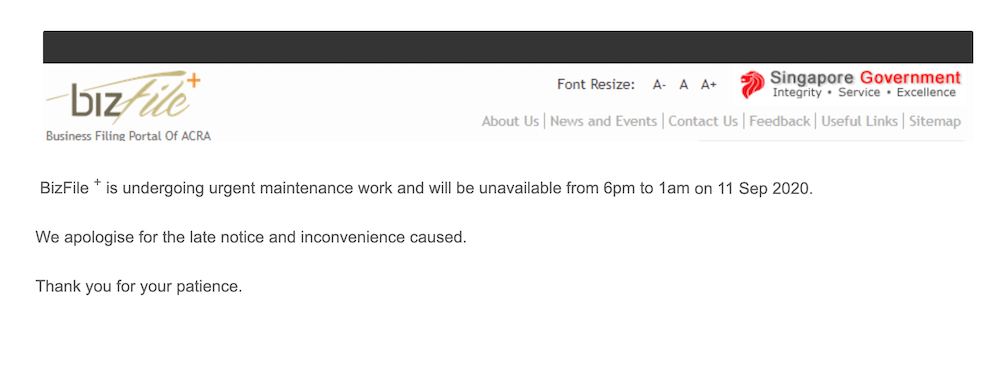4th December 2020: Register of Registrable Controller (RORC) transaction to resume in February 2021.
The RORC filing transaction in BizFile+ was suspended in Sep 2020, and will remain suspended until Jan 2021. The transaction is scheduled to resume in Feb 2021 and companies and LLPs will be given up to 30 Jun 2021 to lodge the RORC information with ACRA.
15th September 2020: The filing of RORC to ACRA has been temporary suspended until December 2020. As a result, the deadline for filing has been extended to 31st March 2021..
10th September 2020: ACRA had been experiencing issues since 8th September, and the Bizfile portal was continuously under maintenance. In light of this, ACRA has further extended the deadline for the filing of the RORC to 31st October 2020.

In this guide, we will explain the definition as well as the requirements of keeping a Register of Registrable Controllers in a simple, and easy to understand guide.
In order to make this guide easy to understand for the layman; we had to make certain assumptions. This guide should educate most small business owners on their basic requirement.
What is the Register of Registrable Controllers (RORC)?
The Register of Registrable Controllers (RORC) is essentially a document which lays out the Controllers of the Company.
ACRA has made this mandatory for all companies from 31st March 2017 to maintain the RORC. By doing so, ACRA aims to make both the ownership and control of corporate entities more transparent. This will restrict the misuse of corporate entities for unlawful purposes.
The main difference now, in 2021 is that this requirement is further “enhanced” by stipulating that the RORC must also be submitted to ACRA online – through BizFile+.
In addition, this mandatory register will uphold Singapore’s reputation as a trusted financial hub and to coincide with international standards.
What, or who is a "controller"?
A controller is defined as someone who has either significant interest or significant control over the company. In general, the controller can be either an Individual, or an entity (eg. as a corporate shareholder).
| Controller of the Company | |
|---|---|
| SIGNIFICANT INTEREST Significant interest refers
| SIGNIFICANT CONTROL Significant control refers
|
What are the particulars that must be kept?
- Full name
- Aliases, if any;
- Residential address;
- Nationality;
- Identification card number or passport number;
- Date of birth;
- Date on which the registrable individual controller became an individual controller of the company; and
- Date on which the registrable individual controller ceased to be an individual controller of the company; if applicable.
- Entity Name;
- Unique Entity Number issued by the Registrar, if any;
- Address of registered office;
- Legal form of the registrable corporate controller;
- Jurisdiction where, and statute under which, the registrable corporate controller is formed or incorporated;
- Name of the corporate entity register of the jurisdiction where the registrable corporate controller is formed or incorporated, if applicable;
- Identification number or registration number of the registrable corporate controller on the corporate entity register of the jurisdiction where the registrable corporate controller is formed or incorporated, if applicable;
- Date on which the registrable corporate controller became a corporate controller of the company; and
- Date on which the registrable corporate controller ceased to be a corporate controller of the company, if applicable.
Mandatory steps to take to identify and obtain information of controllers
Companies must take appropriate action to both identify and obtain the required information on their controllers by sending out notices. These notices must be sent to:
- Anyone whom they know or have reasonable grounds to believe to be controllers and
- Anyone who knows the identity of the controllers or is likely to have that knowledge.
Sending of notices
Notices and replies to the respective notices can be sent and received in either physical hard copy or electronically soft copies.
There are specific formatting requirement of the notices, and the templates are provided from ACRA. However, there are complicated terminology used by ACRA that may be difficult to understand. As such, if you are sending out the notices, you can expect to receive questions pertaining to them.
Mandatory Filing of RORC from July 2020
All applicable companies, unless exempted must lodge information on their RORC with ACRA via BizFile from July 2020. This is in addition to the existing requirements for companies and LLPs to maintain a RORC at the registered office address.
In other words, if there are changes to the RORC after the initial submission, any changes must be submitted online to ACRA and updated on either the physical or softcopy record in the company’s registered or filing agent’s address within 2 days.
Timeline for filing of RORC with ACRA
ACRA’s specific instruction is to file the information of the existing RORC with ACRA’s Central Register of Controllers, within 30 days from 30 July 2020. In other words, by 29th August 2020.
However, following the exit of the Circuit Breaker and to assist business entities to ease into the resumption of normal business activities, ACRA has allowed entities to file their RORC information with ACRA by 29 September 2020 31st March 2021 updated 15 Sep.
Penalties for failing to lodge the RORC
Failing to lodge the RORC to ACRA will imply that the respective entity is guilty of an offence. If found liable upon conviction, a fine not exceeding $5,000 will be issued.
Other key facts about the RORC
- The register can be maintained in either physical hard copies or electronic soft copies
- The registers of registrable controllers will be kept only by the corporate entity and if filed to ACRA will both, not be made available to the public and not available for purchase
- Companies and LLPs will have to declare with ACRA the location of the company’s register of registrable controllers when filing the company’s annual returns or annual declaration. Usually, your company secretary would aid with this during the annual filing submission.
- A controller is required to provide and update information to the company/LLP
Entities exempted from maintaining the RORC
Entities that are exempted from maintain RORC are listed under Fourteenth and Fifteenth Schedule of the Companies Act, and Sixth Schedule of the Limited Liability Partnerships Act. If you meet any of the criteria below, you would be exempted.
Local Companies
- A public company which shares are listed for quotation on an approved exchange in Singapore;
- A company that is a Singapore financial institution
- A company that is wholly owned by the Government
- A company that is wholly owned by a statutory body established by or under a public Act for
a public purpose; - A company that is a wholly-owned subsidiary of a company mentioned above
- A company which shares are listed on a securities exchange in a country or territory outside
Singapore and which is subject to regulatory disclosure requirements and requirements relating to adequate transparency in respect of its beneficial owners
For most business owners, if you are a private limited company in Singapore, you are not exempted, and must submit the RORC to ACRA. It is important also to note that, even if you are a dormant company, so long as you do not meet the above following exemption criteria, you still must file the RORC.
Foreign Companies
- A foreign company that is a Singapore financial institution
- A foreign company that is a wholly-owned subsidiary of a foreign company that is a Singapore financial institution
- A foreign company which shares are listed on a securities exchange in a country or territory
outside Singapore and which is subject to regulatory disclosure requirements and requirements relating to adequate transparency in respect of its beneficial owners
Limited Liability Partnerships
- A LLP that is a Singapore financial institution
- A LLP which all partners are companies or foreign companies exempted from the requirement to maintain the register of registrable controllers.
Video explanation by ACRA
How can Leftright Corporate help with the RORC?
We understand the information listed in this guide may seem immense, complicated, or confusing. As the Register of Registrable Controllers is an updated requirement for all companies unless exempted, it is paramount to not take it lightly. Especially since a hefty fine of up to $5,000 may be imposed for failure to filing.
If you are reading this as a client of our Company Secretary Service – there are no actions required on your end. Leftright Corporate will handle all of the above for you at no additional fee. The above would be For Your Information (FYI) only. As always please feel free to reach out if us if you require clarification.
If you are a business owner, the following are steps you must take:
- Identify the controllers of your company
- Send out the notices and get their respective replies
- Keep a record either in hard or soft copy in your registered address
- From 30th July 2020, submit and lodge the information to ACRA through BizFile
- Make sure to update both the soft/hardcopy and submit the lodgement on ACRA if there are any changes
- When filing your annual return, specify where the hard/soft copy of the RORC is kept.
Alternatively, have a peace of mind that all of the above will be taken care of, and included as part of our Essential Company Secretary Service already includes both the safekeeping, and updating of RORC. No additional fees would apply even if notices have to be sent out.
You may also reach out to us if you have questions, we are always happy to help.







